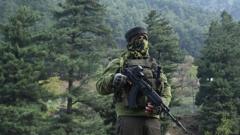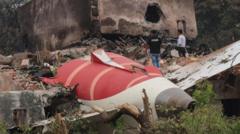The claims come in the wake of a deadly attack in Indian-administered Kashmir, raising fears of military escalation.
**Tensions Escalate as Pakistan Claims Imminent Indian Military Strike**

**Tensions Escalate as Pakistan Claims Imminent Indian Military Strike**
Pakistan voices concerns over alleged Indian military plans, intensifying Kashmir conflict.
In a significant escalation of tensions between India and Pakistan, Pakistani Information Minister Attaullah Tarar has stated that Islamabad has received "credible intelligence" indicating that India is planning a military strike within 24 to 36 hours. This assertion follows an incident in Indian-administered Kashmir, where militants killed 26 tourists near Pahalgam, sparking accusations from India that Pakistan is backing the attackers—a claim that has been vehemently denied by Islamabad.
Tarar articulated concerns that India may leverage the recent attack as a “false pretext” to initiate military action. He warned that any military aggression would be met with a firm and decisive response from Pakistan. This rhetoric amplifies fears of a renewed military confrontation similar to past incidents in 2016 and 2019, which saw escalated military responses following high-profile militant attacks.
The deadly incident in Kashmir marked the worst attack on civilians in the region in two decades, rekindling long-standing hostilities over the disputed territory. The region has been a source of conflict between the two nations since their partition in 1947, with both claiming full control yet administering only parts of it.
In reaction to the attack, Indian authorities have ramped up security measures in Kashmir, detaining over 1,500 individuals for questioning and demolishing properties of suspected militants. While Indian officials have not identified a specific group responsible for the shootings, police have named individuals allegedly linked to the attack, including two Pakistani nationals.
The attack has inflamed nationalistic sentiments in India, with Prime Minister Narendra Modi vowing to pursue and punish those responsible without relent. As the international community watches closely, the situation remains precarious, with the potential for further military interventions looming on the horizon.
Tarar articulated concerns that India may leverage the recent attack as a “false pretext” to initiate military action. He warned that any military aggression would be met with a firm and decisive response from Pakistan. This rhetoric amplifies fears of a renewed military confrontation similar to past incidents in 2016 and 2019, which saw escalated military responses following high-profile militant attacks.
The deadly incident in Kashmir marked the worst attack on civilians in the region in two decades, rekindling long-standing hostilities over the disputed territory. The region has been a source of conflict between the two nations since their partition in 1947, with both claiming full control yet administering only parts of it.
In reaction to the attack, Indian authorities have ramped up security measures in Kashmir, detaining over 1,500 individuals for questioning and demolishing properties of suspected militants. While Indian officials have not identified a specific group responsible for the shootings, police have named individuals allegedly linked to the attack, including two Pakistani nationals.
The attack has inflamed nationalistic sentiments in India, with Prime Minister Narendra Modi vowing to pursue and punish those responsible without relent. As the international community watches closely, the situation remains precarious, with the potential for further military interventions looming on the horizon.






















